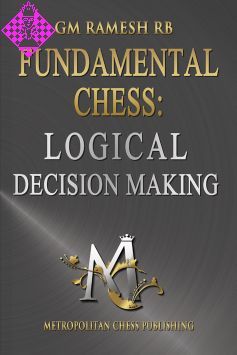Article Number
LXRAMFC
Author
Fundamental Chess: Logical Decision Making
287 pages, paperback, Metropolitan, 1. edition 2015
Discontinued
GM Ramesh RB is one of the world’s most successful coaches, having trained many of India’s top talents to become International Master and Grandmasters. Ramesh also impressed in his stellar commentary for the 2013 World Chess Championship match between Magnus Carlsen an Vishwanathan Anand. In his first published book, Ramesh instructs the reader on how to use logical reasoning to guide decision making. Through a combination of thoughtful prose and instructive examples of principled chess play, the reader will develop an intuitive sense for finding the correct path in any position.
Ramesh’s deep coaching experience of young players shines through in his insightful and practical writing.
The book is divided into three parts:
Ramesh’s deep coaching experience of young players shines through in his insightful and practical writing.
The book is divided into three parts:
·Part 1 - Logical Reasoning
·Part 2 - Practical Chess Play
·Part 3 - Fundamentals of Chess Training
| EAN | 9780985628161 |
|---|---|
| Weight | 460 g |
| Manufacturer | Metropolitan |
| Width | 15.2 cm |
| Height | 22.8 cm |
| Medium | Book |
| Year of Publication | 2015 |
| Author | RB Ramesh |
| Language | English |
| Edition | 1 |
| ISBN-13 | 978-0985628161 |
| Pages | 287 |
| Binding | paperback |
005 Preface
006 Introduction
009 PART ONE: Logical Reasoning
018 Ch 1 Assessment of the Position
066 Ch 2 The Problem of Choices
091 Ch 3 Choosing Between Active and Passive Defense
104 Ch 4 Exchanging Pieces
123 PART TWO: Practical Chess Play
125 Ch 5 Initiative
144 Ch 6 Converting an Advantage
156 Ch 7 Maintaining Tension
168 Ch 8 Improving the Position of Pieces
208 Ch 9 Playing on Colors
225 Ch 10 Prophylactic Thinking/The Drawback Principle
232 PART THREE: Fundamentals of Chess Training
234 Ch 11 Studying the Opening
247 Ch 12 Tournament Preparation
256 Ch 13 Essential Endgame Principles
265 Ch 14 The Importance of Results and Ratings
270 Ch 15 Self Analysis and Self Control
275 Ch 16 Learning and Unlearning
278 Ch 17 Using Computers
281 Conclusion
284 Index of Games
287 Bibliography
006 Introduction
009 PART ONE: Logical Reasoning
018 Ch 1 Assessment of the Position
066 Ch 2 The Problem of Choices
091 Ch 3 Choosing Between Active and Passive Defense
104 Ch 4 Exchanging Pieces
123 PART TWO: Practical Chess Play
125 Ch 5 Initiative
144 Ch 6 Converting an Advantage
156 Ch 7 Maintaining Tension
168 Ch 8 Improving the Position of Pieces
208 Ch 9 Playing on Colors
225 Ch 10 Prophylactic Thinking/The Drawback Principle
232 PART THREE: Fundamentals of Chess Training
234 Ch 11 Studying the Opening
247 Ch 12 Tournament Preparation
256 Ch 13 Essential Endgame Principles
265 Ch 14 The Importance of Results and Ratings
270 Ch 15 Self Analysis and Self Control
275 Ch 16 Learning and Unlearning
278 Ch 17 Using Computers
281 Conclusion
284 Index of Games
287 Bibliography

